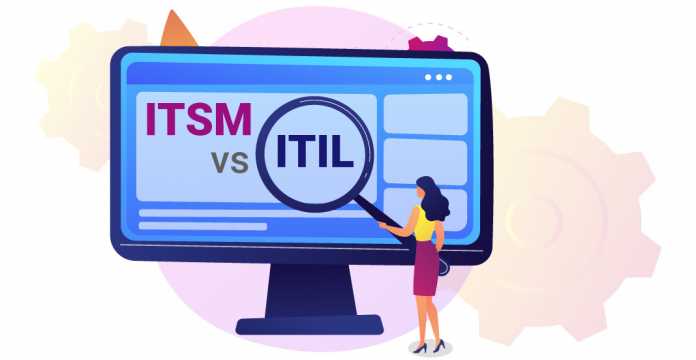
One of the most common questions when it comes to IT service management is: “What is the difference between ITSM and ITIL®?” In this article, let us explore the concept of ITSM vs ITIL.
IT Service Management (ITSM)
IT service management, or ITSM, is how IT teams and companies manage their IT services and their delivery to the end-users. This includes the entire lifecycle of an IT service:
- Designing of the service
- Creation of the service
- Delivery of the service
- Support and maintenance of the service
There are ITSM teams present in organizations across all industries, and it is their responsibility to make sure that all the IT services and technologies present or in use by the organization are operating efficiently and optimally.
ITSM teams operate with the belief that IT is a service that is provided to organizations. It is a part of its core operations and not just a separate department. ITSM approaches are focused on creating and implementing the IT technologies used by an organization, creating processes that will help with the implementation of the IT services, and teaching the entire organization how to adapt to the new process.
ITSM brings a lot of value to organizations and comes with a lot of benefits. Some of the benefits of implementing IT service management practices in a company are:
- ITSM helps in regulating all the processes of the company to create a more streamlined way of operating deliveries and documentation
- Effective ITSM creates a framework in the organization that focuses on improving productivity within the employees
- All the processes implemented through IT service management follow the structure and are considered to be the best practices implemented in the organization
- ITSM also helps maintain compliance regulations within the company
- Implementing ITSM practices helps organizations improve their cost efficiency and increase their overall understanding of the IT services used in the company
- ITSM also helps companies reduce the impact of any disruptions the enterprise might face and reduce the overall chances of them taking place in the first place
- It eliminates all unnecessary manual workflows and processes
- ITSM also helps improve collaboration between teams in the organization
- It is possible to create insightful reports using ITSM processes, which will help improve the organization’s services and output as a whole
For the rest of this article on ‘ITSM vs ITIL’, let is discuss the relationship between these two IT service management terminologies.
ITIL 4 (Formerly known as Information Technology Infrastructure Library)
ITIL was created as a framework to help companies adopt efficient management strategies for their IT environment. ITIL has evolved over time to adapt to the changing environments in the IT sector, and ITIL 4 is the latest updated version. The founding principle of ITIL 4 is that a product or service cannot be delivered to the customers as an end product but instead co-created with feedback from the end-users to bring out the maximum value from the service provided.
ITIL 4 has been created keeping the best practices from the previous versions of ITIL in mind as well as including the new and evolving practices of IT service management as a whole. The ITIL 4 principles are listed out, keeping the changing working environment in mind. Digital transformation is a key factor that ITIL 4 addresses. Changes in working habits also include changes in the methodologies that organizations follow. ITIL 4 has been created, keeping this in mind as well. It has adapted to the organizational shift towards a more Agile and Lean way of operations and can help simplify the transition as well.
There are many benefits of using the ITIL framework to improve the way IT services are managed in the company. Some of them are:
- The ITIL framework is designed keeping customer needs and expectations as a primary goal, which means the success rate of the product or service will be significantly higher
- It improves the overall service management aspect of any organization
- It helps organizations remain compliant with all the regulations
- Aids the digital transformation process of organizations
- Helps create more meaningful and innovative services
- A cost-effective option because ITIL generates insightful reports and is implemented in a way that promotes efficient and effective delivery and prevents any risks
- The ITIL certification is a globally recognized
- It aligns the goals of IT departments with the overall business goals of the organization
- ITIL takes an iterative approach to deliver value, which means there is always a scope for improvement in the services provided
- ITIL considers all the stakeholders of the service, not just the development teams and end-users
ITSM vs ITIL 4: Major Differences
From the points mentioned above, one can quickly notice that ITSM and ITIL are quite similar. They have a lot of points that overlap. This is because ITIL 4 is a part of the overall IT service management sector. Once organizations begin to adopt IT as a service in their enterprise, there are many frameworks available that they can use to implement ITSM effectively. ITIL is one such framework.
ITIL is a framework created to adopt the best practices of ITSM strategies into the organization’s processes. It helps companies improve their services and meet their business goals after aligning their IT with their strategic goals.
ITSM is a discipline in itself. On the other-hand, ITIL is a way to achieve this discipline. ITSM is concerned with the creation, design, implementation, and support of IT services. In contrast, ITIL is a framework that can help with the implementation stage to increase the value generated from these IT services.
Like ITIL, other frameworks can be used to improve IT services and overall operations as well, such as:
- COBIT framework for IT governance and risk management
- Lean framework for continuous improvement
- Agile and DevOps for keeping up with the continuous changes in the market and advancement in technologies
Final Thoughts
The ITIL 4 certification is a good way for organizations and working professionals to successfully adopt the best ITSM strategies within their company. Upskilling from ITIL v3 to ITIL 4 will help companies create strategies that are best suited for today’s advanced and continuously evolving world of technology. With both practical and theoretical knowledge of ITIL concepts, you will be able to take your ITSM career to a whole new level. If you believe you have what it takes to expand your career scope, then get certified in ITIL certifications which will help you to accelerate your career like never before.
That’s it folks! I hope you have found this article on ‘ITSM vs ITIL’ interesting. Listed below are some popular ITSM certifications that will help you take your career to the next level.















